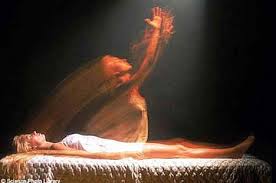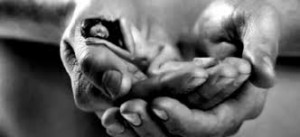The formation of events is initially an emotional, psychic, or psychological function. Events are physical interpretations, conventionalized versions of inner perceptive experience that are then “coalesced” in space and time. Events are organized according to laws that involve, belief, intent, and the intensities with which these are entertained.
Events are attracted or repelled by us according to our loves, beliefs, intents, and purposes. Our world provides a theater in which certain events can or cannot occur. Wars, violence, disasters — these are obviously shared by many, and are a part of our shared psychological and physical environment.
Some people encounter war directly, however, in terms of hand-to-hand combat, or bombing. Others are only inconvenienced by it. Here the mass shared environment is encountered as physical reality according to individual belief, love, and intent. In the deepest meaning there is no such thing as a victim, either of war, poverty, or disease. This does not mean that war, poverty, and disease could not be combatted, for in the terms of conventional understanding it certainly appears that men and women are victims in many such cases. Therefore they behave like victims, and their beliefs reinforce such experience.
Our beliefs form our reality, and this means that our beliefs structure the events we experience.
Such experience then convinces us more thoroughly of the reality we perceive until a vicious circle is formed, in which all events mirror beliefs so perfectly that no leeway seems to appear between the two.
If this were really the case, however, mankind’s history would never change in any true regard. Alternate paths of experience — new possibilities and intuitive solutions — constantly appear in the dream state, so that man and woman’s learning is not simply dependent upon a feedback system that does not allow for the insertion of creative material. Dreaming then provides the species with learning experience not otherwise available, in which behavior and events can be judged against more developed and higher understanding that present in conventional daily reality at any level.
There may be, for example, complications arising from a person’s intents, loves, and desires that cause the individual to seek certain events that his of her very beliefs make impossible. Current experience will provide a dilemma in which desired goal seems impossible.
In such instances a dream, or a series of them, will often then alter the person’s beliefs in a way that could not otherwise occur, by providing new information. The same data might come in a state of inspiration, but it would in any case be the result of an acquisition of knowledge otherwise inaccessible. Love, purpose, belief, and intent — these shape our physical body and work upon it and with it even as at other levels cellular consciousness forms it.
Love is a biological as well as a spiritual characteristic. Basically, love and creativity are synonymous. Love exists without an object. It is the impetus by which all being becomes manifest. Desire, love, intent, belief and purpose — these form the experience of our body and all the events it perceives. We cannot change one belief but it alters our body experience. The great give-and-take between biological and psychological integrity occurs constantly. Our thoughts are as active as our cells, and as important in maintaining our physical being.
Our thoughts are also as natural as our cells. Our thoughts propel us toward survival and growth also, and in the same way that cells do. If we find oneself in physical difficulties health-wise, we cannot say: “Why doesn’t my body stop me and assert its own wisdom?” Because in the truest sense there is no division between our thoughts and our body. Our thoughts multiply even as our cells do. Our thinking is meant to ensure our survival in those terms, as much as our body mechanism.
The give-and-take between the two occurs largely in the dream state, where constant translations of data occur. Our thoughts and our body cells are reflected one in the other.
I am going to suggest a series of exercises. They should be regarded as creative exuberant games. They will acquaint us with our psyche, or our own greater experience of oneself, by helping us shift our attention to aspects of our own experience that usually escape our notice.
The exercise will not work, however, in the way they are meant to if they are embarked upon with too serious an air or intent. They should be considered as creative play, though of a mental nature, and they actually consist of mental endeavors tried quite spontaneously by children. So they are not to be regarded as esoteric accomplishments. They represent the intent to discover once again the true transparent delight that we once felt in the manipulation of our own consciousness, as we looped and unlooped it like a child’s jumping rope.
The dream state is the source of all physical events, in that it provides the great creative framework from which we choose our daily actuality.
Children quickly learn their parents that experience must be structured in a certain conventional pattern. In their own periods of imaginative play, however, children utilize dream events, or events perceived in dreams, while clearly realizing that these are not considered actual in the “real” world.
Physical play is pleasant, and accompanied by high imaginative activity. Muscles and mind are both exercised. The same kind of activity occurs in the child’s dream state as it learns to handle events before they are physically encountered. Intense dream activity is involved. Some dream events are more real to the child than some waking events are — not because the child does not understand the nature of experience, but because he or she is still so close to the emotional basis behind events. Some of the exercises will put us in touch with the ways events are formed.
Children’s play, creativity, and dreams all involve us with the birth of events in the most direct of fashions. The games that we play or habitually observe will, of course, tell us much about the kind of organization that occurs in our own experience. Overall, we organize events around certain emotions. These can be combative, in which there will always be good teams and bad teams, salvation or destruction, winning or losing.
The events of our life will follow a similar structure. Before conditioning, children’s play follows the love of performance, of body or imagination, for performance’s sake only; the expansion of mental or physical abilities. The most satisfying of events involve those characteristics. The exercises will have to do with the natural joyful manipulation of the imagination that children employ.









